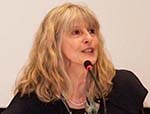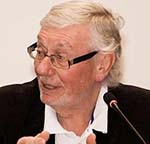HOLDING AND CONTAINING: reflections on the infantile in the work of Klein, Winnicott and Bion Part 2
This webinar will be in English.
Panellists: Jan Abram and Bob Hinshelwood
Moderator: Eléana Mylona
Both Winnicott and Bion were strongly influenced by Klein albeit in different ways. They were both concerned with early psychic development and recognised how the infantile layers of development manifested in clinical practice. But their basic clinical paradigms are distinct. Winnicott’s paradigm evolved out of his different perspectives on the infantile from Klein while Bion’s advances are founded on Kleinian principles. The concept of holding is often underrated while Bion’s concept of container-contained can often be too loosely applied.
Following the success of the first part of this webinar on 11th April, we are pleased to welcome Jan and Bob back to further develop the ideas they presented and to elaborate on the questions and issues that arose. A recording of Holding and Containing Part 1 can be watched
here.
Jan and Bob will begin the webinar by presenting a brief summary of the key points of their part one presentations before addressing some of the unanswered questions from that session. Additional time has also been allocated for further questions and comments.
Up to 3,000 places are available for this webinar. These will be allocated on a first-come, first-served basis at the scheduled time of the webinar.
Register for your free place below; if you are unable to attend the live session but would like to receive a recording, please continue to register and a recording will be automatically emailed to you once the live session has ended.
Panellists: Jan Abram, Bob Hinshelwood
Moderator: Eleana Mylona
Both Winnicott and Bion were strongly influenced by Klein albeit in different ways. They were both concerned with early psychic development and recognized how the infantile layers of development manifested in clinical practice. But their basic clinical paradigms are distinct. Winnicott’s paradigm evolved out of his different perspectives on the infantile from Klein while Bion’s advances are founded on Kleinian principles. The concept of holding is often underrated while Bion’s concept of container-contained can often be too loosely applied.
In this webinar each author will present the different perspectives on the infantile in the work especially of Winnicott and Bion, to highlight the similarities and differences in their elaborations. Abram argues that Winnicott’s contribution on the role of the Mother enhances and expands the meaning of relating while Hinshelwood argues that Bion’s container-contained does two things: firstly, it indicates the porous nature of the ego boundary; and secondly, it emphasises the infantile in each person now, in the present. After each presentation the authors will engage in a short dialogue before inviting the audience to participate.
 Jan Abram
Jan Abram is a Training and Supervising Psychoanalyst of the British Psychoanalytical Society; Visiting Professor of the Psychoanalysis Unit, University College, London; Vice President, European Psychoanalytic Federation. Jan Abram has published several books and articles notably: The Language of Winnicott (1st edition 1996; 2nd edition 2007), Outstanding Academic Book of the year (1997); Donald Winnicott Today (2013); The Clinical Paradigms of Melanie Klein and Donald Winnicott: comparisons and dialogues (2018 with co-author R. D. Hinshelwood) and The Surviving Object: psychoanalytic clinical essays on psychic survival-of-the-object (forthcoming 2021), New Library of Psychoanalysis, Routledge.
 Bob Hinshelwood
Bob Hinshelwood is a fellow of the British Psychoanalytical Society, and a Fellow of the Royal College of Psychiatrists, and is no Professor Emeritus of the University of Essex, UK. He has written widely on Melanie Klein and Wilfred Bion, as well the importance of the psychoanalytic unconscious in groups and organisations. He spent much of his career in the National health Service, with a special interest in therapeutic communities and was Director of the Cassel Hospital.